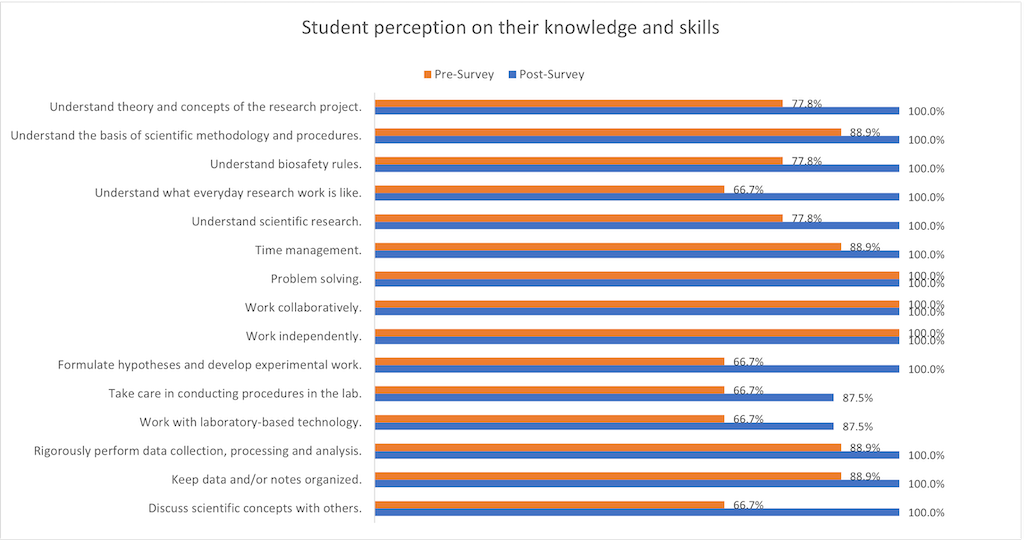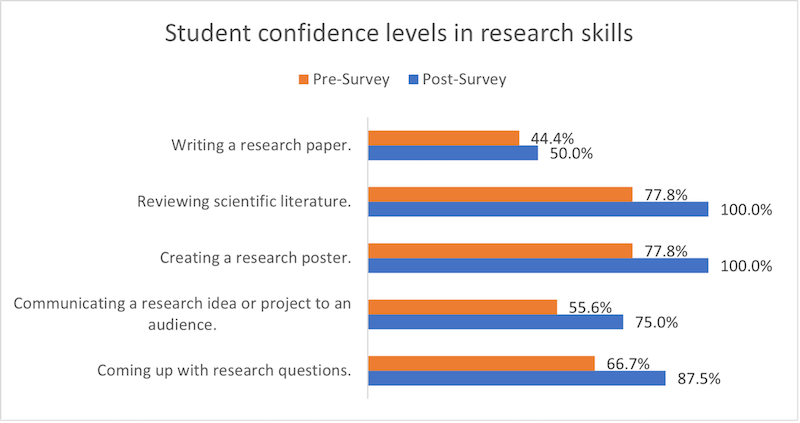STEM Advantage: Research in the University Prep Program
Our Program
Undergraduate research opportunities are often unavailable to community college students, esp. low-income and first-generation students, creating an equity issue in STEM education/transfer (Graham et al. 2013). STEM Advantage: Research in the University Prep Program is a summer opportunity for undergraduate students to experience translational research under the supervision of a faculty mentor. In Summer 2024, both PRISM (S-STEM) and LSAMP students participated in the programming that was hosted via the Louis Stokes North Star STEM Alliance (LS-NSSA). Our collaboration worked on removing the ongoing existing and new barriers to undergraduate research in primarily teaching institutions. STEM Advantage sets itself apart in several ways. It offers a structured curriculum covering essential laboratory skills, soft skills, and professional development workshops while working on an active research project in their field of study. Moreover, this program offers an experience for undergraduate students enrolled in any STEM discipline at our partner institutions, allowing us to benefit more students from a wide variety of backgrounds. Taken together, STEM Advantage fulfills a critical need for undergraduate students that is currently missing.
Summer 2024 Pilot Program Evaluation
The Pathways to Research Program objective is to engage students more deeply in their STEM disciplines through research, faculty mentorship, professional development, and preparation for graduate school. The program will culminate in a symposium and students will present their research findings.
There were nine undergraduate students from various institutions (3 – St. Olaf, 4 – Normandale Community College, and 2 – Century College) that participated in the Summer 2024 Pathways to Research Program. The majority of students identified as female (67%), BIPOC (Black – 22%, Hispanic/Latino 11%, and Asian 22%) and first generation (56%). 75% of students were from community colleges with 67% planning on transferring within the next academic year.
Pre- and Post-survey Summaries
Student participants regarded the program highly and rated the overall program experience with 8.38 (out of 10). They felt the most positive aspects of the program were the research sessions (9.25/10), guidance from research mentors (9.13/10) and STEM career field trips (9.13/10). At the beginning of the program, students noted that the main reason they participated in the program was to get hands-on research experience. At the end of the program, they stated that what they appreciated most about the program was being able to make connections with mentors and their cohort.
The impact of Pathways to Research Program on student participants can be seen the strongest through their ratings of gained knowledge/skills and confidence to conduct research. Figure 1, shows student ratings of their knowledge and skills, pertinent to STEM fields. They rated gains in almost all knowledge and skill areas. The largest gains were seen in their ability to understand what everyday research work is like, formulate hypotheses and develop experimental work, and discuss scientific concepts with others. Students are the least confident in their ability to write a research paper, even though there are gains in these levels, there is still room for improvement in the design of this program.
Figure 1. Student perception on their knowledge and skills.

Figure 2, shows student confidence levels in conducting scientific research; from formulating a research question to communicating their research project to audiences.
Figure 2. Student confidence levels in research skills.

Overall, this program has achieved the objective of engaging students and establishing a strong foundation of lab skills and research methods through hands-on lab and mentored research experiences. In addition, this program has also provided students with professional development and career exploration opportunities that allows students to prepare for their future in STEM.
Student Focus Group Summary
The focus group discussion gathered participants' experiences in the program. The conversation begins with each participant introducing themselves and explaining why they joined the program. Reasons range from gaining research experience, exploring career interests, and seizing opportunities not available at their respective colleges. The participants express initial excitement and some concerns, such as the program's short duration.
Participants shared their expectations and whether they were met or not. Many anticipated learning research processes and making connections, which they found satisfying. Some participants were pleasantly surprised by the depth of data processing and the educational insights gained. There were mixed feelings about the orientation and initial guidance, with some finding it challenging to catch up with ongoing research.

The discussion moved toward the lab skills sessions, which were generally highly valued. Participants appreciated the practical experience with lab equipment like micropipettes and coding skills in Python and MATLAB. However, there were notable challenges, including issues with accessing necessary software and the steep learning curve associated with coding. Participants emphasized the importance of having access to free or institution-supported software.
The relationship between mentors and mentees was explored, with most participants expressing positive experiences. They highlighted the importance of having mentors who were approachable and provided both professional guidance and personal support. The discussion also touched on logistical challenges such as transportation and access to university buildings, suggesting improvements for future iterations of the program.

Participants reflected on how the program influenced their interest in STEM fields. Most felt the program reaffirmed or increased their interest in STEM and research, noting the value of interdisciplinary collaboration and the diverse STEM community they encountered. The experience also opened some participants' eyes to new career paths and higher education opportunities, such as pursuing PhDs.
Finally, participants shared additional comments and feedback, expressing gratitude for the opportunity. They noted areas for improvement, such as better planning and communication regarding schedules and transportation, and the need for consistent access to lab supplies. Overall, the program was seen as a pivotal experience that could significantly influence their future academic and professional trajectories in STEM.